The Chief Executive Officer (CEO) of the Ghana Cocoa Board (COCOBOD), Joseph Boahen Aidoo, said the CocoaSoils programme will help farmers to adopt best practices to improve crop yield.
The programme, which will provide information on integrated soil fertility management to cocoa farmers, will improve the fertility of farmlands and prevent deforestation, thereby increasing cocoa yield.
Farmers would receive information on the importance of nutrient supply through fertilizer application and the need to implement good agriculture practices to maximize yield and income.
Ghana produced a record 1.033 million tonnes of cocoa beans for the 2020/2021 season, an improvement on the previous record of 1.024 million tonnes in the 2010/2011 season.
Mr. Aidoo said over the years, farmers had been experiencing a decline in cocoa yield due to some practices including slash and burn, which resulted in soil depletion and degradation of the land and environment.
“We see this project to be very dear to the cocoa industry because it’s going to help us understand the appropriate and proper ways of managing our soils to the best of the sector, and also bring about the sustainability of the industry,” he said.
“For us in cocoa, this is very important because soils actually constitute the bedrock to whatever we do in production – soil management, water filtration, discharge of toxins ….as it also provides the needed nutrients for the plants.”
Dr. Richard Asare, the Project Coordinator of the CocoaSoils, said the manual would provide scientific and practical insight on best soil and farm management practices to cocoa farmers.
The farmers, through training, would gain a deeper understanding of the cocoa trees’ nutritional requirements and address the challenges of expansion of farmlands into forested areas, he said.
Gaining such an understanding of the soils by both farmers and policymakers would help improve income and enhance sustainable cocoa production and mitigate cocoa-driven deforestation risks in the country.
The manual, titled: “Managing soils for increased productivity and decreased deforestation in cocoa: A training manual for field officers,” has three sections with technical and practical contents.
This comprised introduction to increasing cocoa productivity and deforestation, good agricultural practices to increase productivity, and soil fertility management.
It was developed to transmit up-to-date knowledge and know-how, and the skills required to foster communication between field officers and cocoa farmers.
It was reviewed by the Partnership for Delivery (P4D) Committees in Cameroon, Côte d’Ivoire, Ghana and Nigeria, to ensure that the content was relevant and the language was not too scientific for the farmers





